Arthritis and You
Also by Naheed Ali
Understanding Alzheimers: An Introduction for Patients and Caregivers
The Obesity Reality: A Comprehensive Approach to a Growing Problem
Diabetes and You: A Comprehensive, Holistic Approach
Arthritis and You
A Comprehensive Digest for Patients and Caregivers
Naheed Ali, MD
ROWMAN & LITTLEFIELD PUBLISHERS, INC.
Lanham Boulder New York Toronto Plymouth, UK
Published by Rowman & Littlefield Publishers, Inc.
A wholly owned subsidiary of The Rowman & Littlefield Publishing Group, Inc.
4501 Forbes Boulevard, Suite 200, Lanham, Maryland 20706
www.rowman.com
10 Thornbury Road, Plymouth PL6 7PP, United Kingdom
Copyright 2013 by Rowman & Littlefield Publishers, Inc.
All rights reserved. No part of this book may be reproduced in any form or by any electronic or mechanical means, including information storage and retrieval systems, without written permission from the publisher, except by a reviewer who may quote passages in a review.
British Library Cataloguing in Publication Information Available
Library of Congress Cataloging-in-Publication Data
Ali, Naheed, 1981
Arthritis and you : a comprehensive digest for patients and caregivers / Naheed Ali, M.D.
pages cm
Includes bibliographical references and index.
ISBN 978-1-4422-1901-4 (cloth : alk. paper)ISBN 978-1-4422-1903-8 (electronic)
1. Arthritis. I. Title.
RC933.A365 2013
616.7'22dc23
2012044230
 The paper used in this publication meets the minimum requirements of American National Standard for Information Sciences Permanence of Paper for Printed Library Materials, ANSI/NISO Z39.48-1992.
The paper used in this publication meets the minimum requirements of American National Standard for Information Sciences Permanence of Paper for Printed Library Materials, ANSI/NISO Z39.48-1992.
Printed in the United States of America
Arthritis and You is dedicated to my students, to arthritis patients, and to all who have provided encouragement and support for my research.
Disclaimer
This book represents reference material only. It is not intended as a medical manual, and the data presented here are meant to assist the reader in making informed choices regarding wellness. This book is not a replacement for treatment(s) that the readers personal physician may have suggested. If the reader believes he or she is experiencing a medical issue, professional medical help is recommended. Mention of particular products, companies, or authorities in this book does not entail endorsement by the publisher or author.
Preface
While the importance of being knowledgeable about a disease or condition as a patient or health-care professional is quite obvious, the actual fact is that patients and their caregivers may desire additional information about the condition they deal with. Even in more sophisticated nations, health-care delivery systems find it increasingly difficult to involve their health-care providers in providing sufficient knowledge about a medical condition such as arthritis.
Significance of this Book
Worldwide, arthritis is one of the most prevalent diseases, affecting an estimated 350 million people and 50 percent of people over sixty years of age. The educated patient and well-informed caregiver serve as the most important players in this type of disease management.
As the reader will observe in forthcoming chapters, some types of arthritis tend to precipitate more frequently on the obese and physically less active individuals. In rheumatoid arthritis, though the disease cannot be predicted and there is no primary prevention, measurement of c-reactive proteins and rheumatoid factor may signal a future scenario to a certain extent. People who read and become informed about risk factors such as problematic proteins that predispose them to arthritis can take necessary steps to make lifestyle changes.
Arthritis education is to be seen as organized information, and quality, timely, and sufficiently detailed ideas mostly come as reading. Therefore, arthritis patients and their caregivers can have great leverage on the entire system that involves health-care providers, patients, families of patients, and communities they belong to through reading and becoming well informed. The arthritis patients caregiver is susceptible to injury and other adverse effects due to his or her caregiving activities. Patients receive most of their health care from a family member who is not very knowledgeable about the disease.
Proper information and knowledge of a condition in the form of a book may lead to increased patient compliance. Poor patient compliance is a major health issue, especially in chronic and debilitating conditions such as arthritis that require long-term management and care. When it comes to such a condition as arthritis, patient compliance is the patients willingness and ability to (1) comply with health advice, (2) follow the prescribed medication regimen, (3) visit the physician as scheduled, and (4) go through the required investigations as planned. Patient compliance is also a major determinant of arthritic clinical outcome from a doctors perspective. That said, learning about arthritis improves patient compliance to a degree that enhances the quality of patient-clinician interaction. The informed arthritis patient is a willing and enthusiastic partner in the doctor-patient relationship. The health-care provider finds it less frictional to engage in a productive and outcome-oriented discussion with well-informed patients and physicians. In the many disorders grouped together as the condition of arthritis, lifelong medication is indicated. Most of the drugs used to treat and maintain a reasonable lifestyle have adverse effects that can easily affect patient compliance. Noncompliance with a specified treatment regimen is a rare occurrence among well-informed patients, and a comprehensive book on arthritis such as Arthritis and You provides them with the essential insight that prescription medicine is a balance between the adverse effects of the drugs and the outcome of the natural progress of the disease. Further, an informed caregiver can be a facilitator in the process and an effective agent against patient noncompliance.
Clinical investigations such as those cited throughout this book can reveal many aspects of the condition that a mere clinical examination may lack. Arthritis victims are willing and ready go through the scheduled investigations only if they know their importance and relevance. Patients look to a visit to a doctor with a sense of deep apprehension. Fear of doctors, or iatrophobia, is common among patients who have little knowledge about their conditions. They fear all kinds of interactions with physicians, and most of the time they postpone all doctor visits until the condition becomes worse, needing unpleasant and complicated interventions. An informed arthritis patient knows fully well about the possible outcomes of visits to the doctor, and interacting with the doctor makes the former less anxious.
People with arthritis need to follow a regular schedule of clinical appointments in order to get a proper assessment of the progress of the disease, their response to treatments, and the impact of the disease on the patients physical and psychological well-being. Only patients who know in detail about their disease will realize the value of keeping to the schedule. They will inform their doctor in a timely fashion of any new significant symptoms and adverse drug reactions. They will negotiate with the doctor before they decide to stop taking a certain medication due to its unpleasant side effects. In many chronic and progressive conditions, including arthritis, the aim is to educate the patient to achieve the best possible quality of life and minimize suffering. In achieving this goal, patients are required to follow a self-management process that involves making decisions. In essence, they are their own problem solvers and need thorough knowledge about how to cope with an ever-changing situation. Self-efficacy is the measure of self-management. It is only with an ongoing and thorough educational program that patients can be properly assisted in self-care and management. Arthritis, as the leading cause of disability in the United States, Arthritis sufferers who are educated demand less of the health-care delivery system. Patients such as those diagnosed with arthritis who are on regular treatment can make necessary lifestyle changes. These changes include a weight-reduction plan and physical exercise. As a long-term result, they may not lose as many workdays.

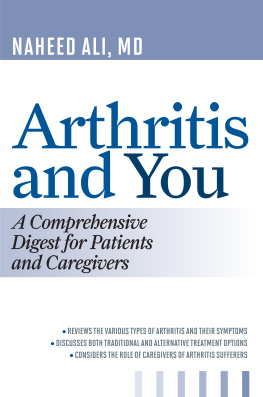
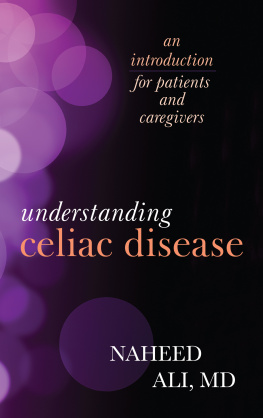
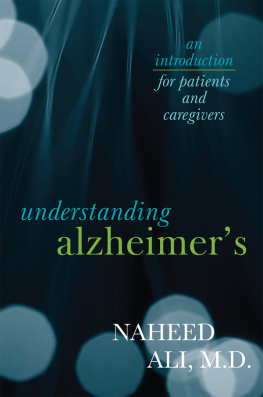





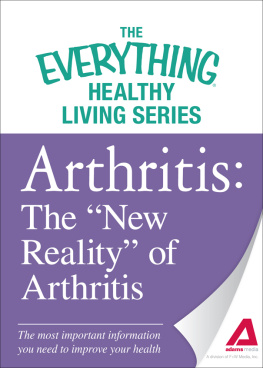
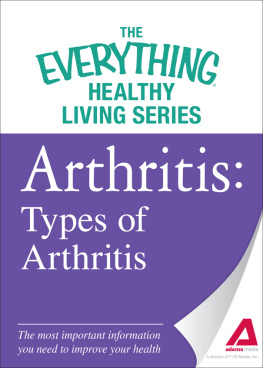

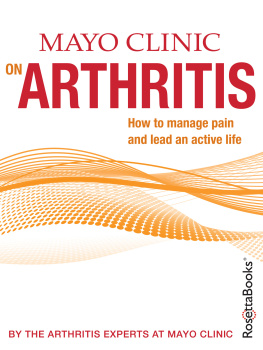
 The paper used in this publication meets the minimum requirements of American National Standard for Information Sciences Permanence of Paper for Printed Library Materials, ANSI/NISO Z39.48-1992.
The paper used in this publication meets the minimum requirements of American National Standard for Information Sciences Permanence of Paper for Printed Library Materials, ANSI/NISO Z39.48-1992.